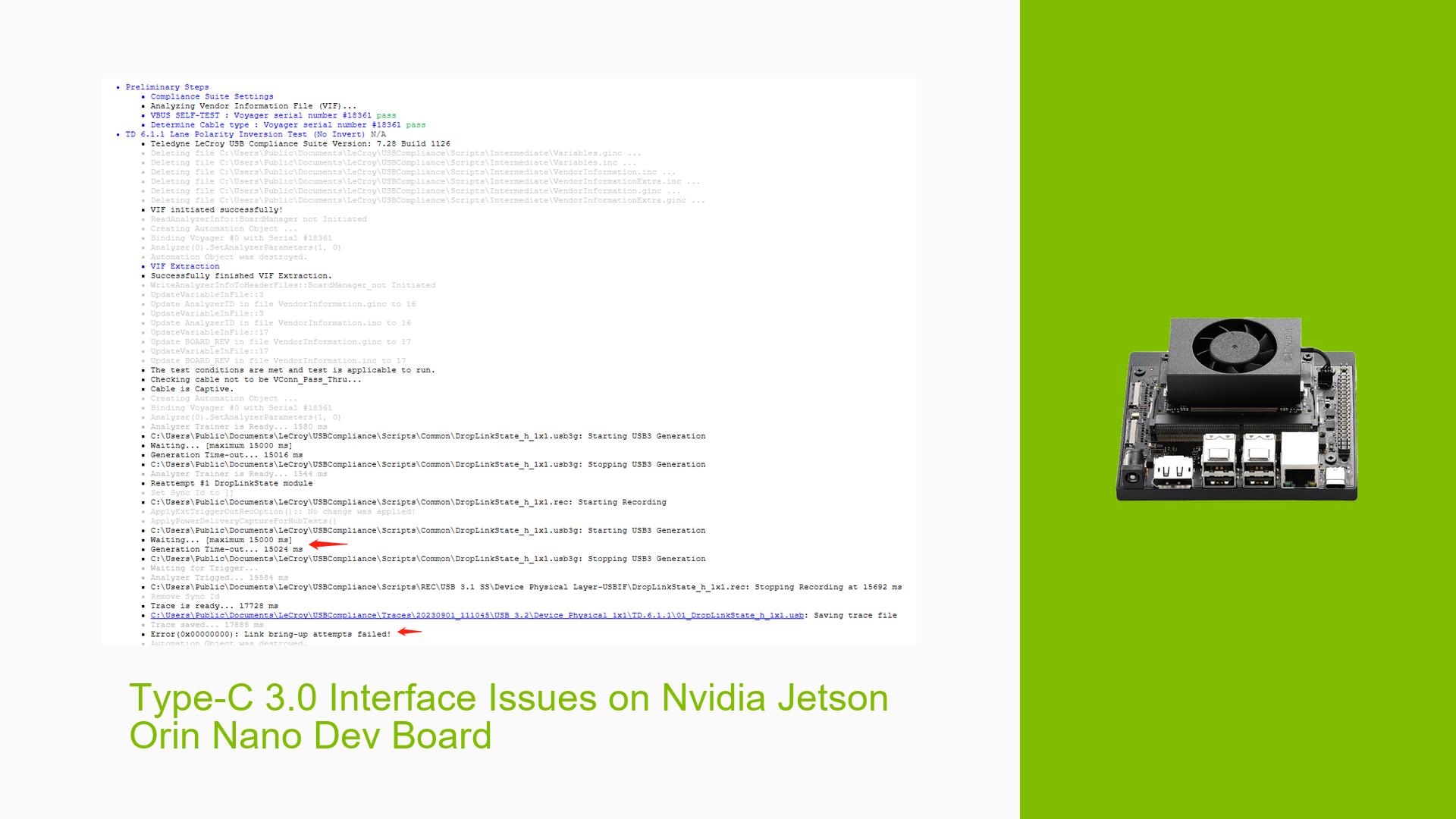Type-C 3.0 Interface Issues on Nvidia Jetson Orin Nano Dev Board
Issue Overview
Users are experiencing issues with the Type-C interface on the Nvidia Jetson Orin Nano Dev Board, specifically that the USB 3.0 functionality is not operational while USB 2.0 works correctly. The problem manifests during setup and testing of custom-designed carrier boards that follow the reference circuit provided by Nvidia.
Symptoms:
- USB 3.0 does not initialize, resulting in the device operating at USB 2.0 speeds.
- Error messages indicating issues with the FUSB301 chip, particularly: "fusb301 1-0025: toggle_time(0) is not updated."
- The USB 3 RX/TX signals show no output during testing.
Context:
- The issue occurs when users connect their custom boards to PCs or during compliance testing.
- Users report that their USB assignment differs from that of the official development kit, which may lead to incompatibility.
Frequency:
The problem appears to be consistent among multiple users who have designed their own boards based on Nvidia’s specifications.
Impact:
This issue significantly affects user experience by limiting the performance of devices that rely on USB 3.0 speeds, potentially hindering development and application performance.
Possible Causes
-
Hardware Incompatibilities: If the custom board’s design deviates from the reference design, it may lead to issues with signal integrity and device recognition.
-
Signal Quality Issues: Poor signal quality due to impedance mismatches can prevent successful communication over USB 3.0.
-
Driver Issues: Incorrect or outdated drivers for the FUSB301 chip may lead to improper initialization of the USB ports.
-
Device Tree Configuration Errors: If the device tree is not correctly modified to match the hardware design, it can prevent proper port initialization.
-
Environmental Factors: External factors such as power supply inconsistencies or temperature variations could affect performance.
-
User Errors: Misconfigurations during setup or testing processes can lead to these issues.
Troubleshooting Steps, Solutions & Fixes
-
Check Signal Integrity:
- Use an oscilloscope or logic analyzer to measure signals on USB 3 TX_P, TX_N, RX_P, RX_N pins.
- Ensure that signals are present; lack of signal indicates a potential device tree mismatch.
-
Review Device Tree Configuration:
- Confirm that modifications to the device tree reflect the custom hardware design.
- Refer to Nvidia’s adaptation guide for detailed instructions on modifying the device tree appropriately.
-
Conduct Compliance Testing:
- Follow guidance from Nvidia’s compliance testing documentation to ensure signal quality meets specifications.
- Adjust settings based on compliance test results to improve signal integrity.
-
Test with Different Hardware Configurations:
- If possible, test with a known working development kit to isolate whether the issue lies within the custom board or configuration.
-
Update Drivers and Firmware:
- Ensure that all relevant drivers for the FUSB301 chip and other components are up-to-date.
- Check for firmware updates that may address known issues with USB interfaces.
-
Inspect Hardware Design:
- Verify that all components used in the custom board match those in Nvidia’s reference design.
- Check for any potential impedance mismatches in connections between different boards (e.g., adapter boards).
-
Adjust Power Supply Settings:
- Ensure that power supply levels are stable and meet requirements for USB 3.0 operation.
-
Document Findings and Progress:
- Keep a log of all tests performed and their outcomes to identify patterns or recurring issues.
-
Seek Community Support:
- Engage with forums or community discussions for additional insights or shared experiences regarding similar issues.
Recommended Approach
Multiple users have reported success by ensuring proper modifications to the device tree and conducting thorough compliance testing as per Nvidia’s guidelines. This should be prioritized as a solution path.
Unresolved Aspects
Further investigation may be needed into specific signal quality issues related to impedance mismatches between adapter boards and carrier boards, as well as potential environmental impacts affecting performance.
